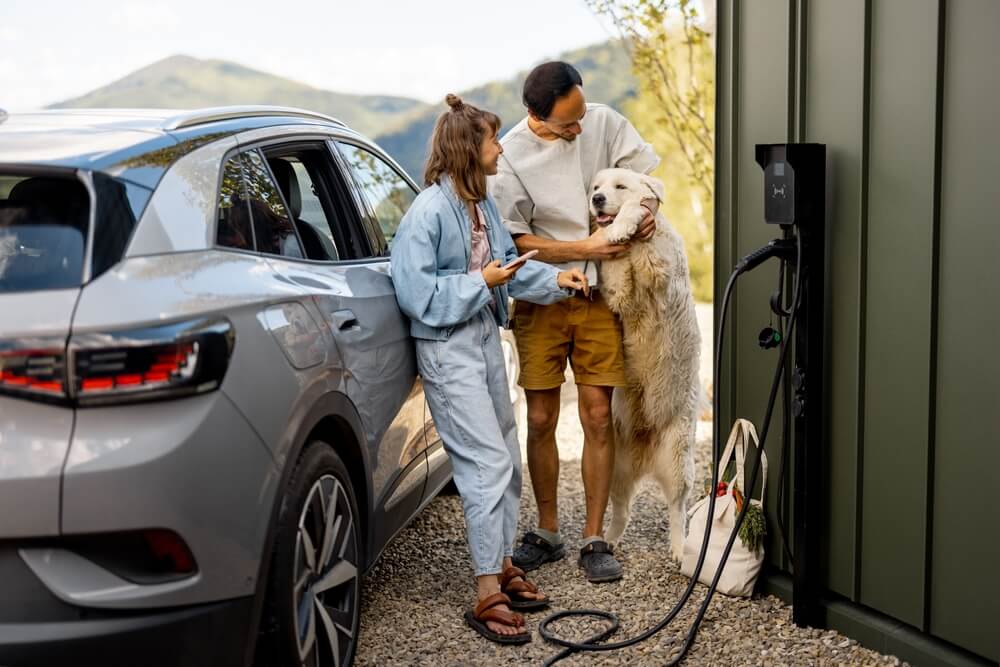The Rise of Electric Vehicles: Can Car Finance Help You Go Green?

The rise in the use of Electric Vehicles (EVs) has been hard to miss in recent years. As the technology advances and becomes more affordable, these cars are becoming a viable option for households across the UK. In fact, at the end of November 2024, there were over 1.3 million fully electric vehicles on our roads!
That equates to just under 4% of all road users, so they are still some way off their combustion engine counterparts. However, with the government planning to end the sale of new petrol cars by 2035, that percentage is set to rise significantly over the coming years, and could electric car finance be the key to unlocking your green future? We thought we would take a look…
The rise of the EV
You might perhaps be surprised to hear the first electric vehicle took to the UK road network all the way back in 1832! However, the EVs that we know and use today are still in their infancy, with the Tesla Roadster appearing in 2008 before the Nissan Leaf, the first mass-produced zero tailpipe emission vehicle, arriving in 2010.
Since then, their use has exploded, and electric vehicles now equate for just under 20% of all new vehicle registrations. While they might have once been shunned by road users, there have been a number of key factors driving a shift in attitude, including:
- Environmental impact
One of the biggest reasons for the rise in EV use is a growing awareness on our impact on the environment. As we become more aware of issues such as global warming, 86.5% of UK adults are taking steps to change their lifestyle and reduce their emissions, and electric vehicles are one of the most effective ways to do this.
- Cost effective
The cost of living crisis has affected everyone, and as fuel costs rise, the lure of electric-powered vehicles is far more appealing. It can cost as little as 3p per mile to charge a car compared to the 24p for petrol and diesel alternatives. For drivers racking up the miles on their daily commute, this can lead to some big savings.
- Technological improvements
Another major driving force behind the attitude towards EVs improving is how far the technology has come on. With battery life and ranges now regularly exceeding 200 miles, it makes them a far more viable option for the average UK driver.
- Incentives and infrastructure
In addition to better technology, government grants, lower road tax and easier access to public charging points have helped accelerate the adoption of EVs.
So what challenges remain?
While the use of electric vehicles is on the rise, there are still a number of challenges that remain and act as a barrier for many UK households. Although these cars are becoming more accessible, the advanced battery technology they utilise is still costly, and the average price of a new EV is much higher than that of a petrol or diesel car. While there will naturally be cost savings over the life of the car with lower fuel and maintenance costs, the initial upfront investment can be a major hurdle for many drivers.
It’s not just about the cost, though. Range anxiety is still a major concern for many drivers, especially those who cover big miles or are not regularly by a public charger while out and about. Even for those who are near public infrastructure, the charge time can also be an issue. While petrol cars take a few minutes to refill, EVs can take several hours.
How electric car finance can help bridge the gap
Although there are undeniably still a few hurdles, these barriers are becoming smaller and the world of electric vehicles more accessible. Electric car finance is also helping to play a vital role in increasing ownership in a number of ways.
Overcoming upfront costs
As we mentioned, one of the biggest challenges to purchasing an electric vehicle is the higher upfront costs in comparison to petrol and diesel alternatives. Car finance is helping to bridge that affordability gap by spreading the cost of an EV over several years. That means instead of having to pay the full amount upfront, buyers can opt for more manageable payments through either Personal Contract Purchase (PCP) or Hire Purchase (HP) options.

An estimated 90% of new cars in the UK are on finance, and as EVs become more common, these financing trends will continue into these greener models.
Predictable monthly costs
It’s not just about the upfront costs, though. Car financing for electric vehicles also provides drivers with predictable monthly payments. As the cost of living finance continues to place pressure on household finances, having a clear and set repayment amount every month allows them to plan their expenses better and avoids any unexpected surprises.
Reduces the risk of depreciation
A lot of drivers have concerns about the resale value of electric vehicles. The depreciation rate for these models is far greater than that of their petrol and diesel counterparts due to the rapid advancements in battery technology, which are quickly making existing models outdated.
Financing options like PCP help to alleviate these concerns by giving buyers the flexibility to return the vehicle at the end of the term instead of having to purchase it outright. This reduces the financial risk of buying outright, paving the way for a greener future.
Finding the right EV finance option
Financing is proving an effective way to start embracing these sustainable vehicles. However, it can be tough to know which option is right for you. If you are unsure, here are some key things to consider:
- Understand your goals
The first thing to consider is how you will use your car and ask yourself key questions such as whether you want to own the car outright at the end, whether low monthly payments are more important, or whether you want flexibility and not be locked into any long-term commitments.
- PCP or HP
When you have answered those questions, you will then need to consider whether you opt for PCP or HP. Personal Contract Purchase (PCP) will see you pay a deposit and then a fixed monthly payment over a set term. At the end of that term, you will then be able to either pay to own the car, return it or trade it in for a new agreement.
A Hire Purchase agreement will see drivers pay a deposit and then fixed monthly payments over a set term until they own the car outright.
- Consider your circumstances
In order to find the right finance option for you, you should also consider your personal circumstances such as overall budget, how much you can afford, and the vehicle you are looking to purchase. This will allow you to review interest rates and find the best rate.
Looking for car finance freedom?
Are you looking to find out more about electric car finance and how it can help unlock the world of electric vehicles? Car Finance 247 is here to help! We’re one of the UK’s leading digital car finance platforms, helping drivers just like you find their dream car.
Want to find out more? Start your journey with our free car finance calculator!
